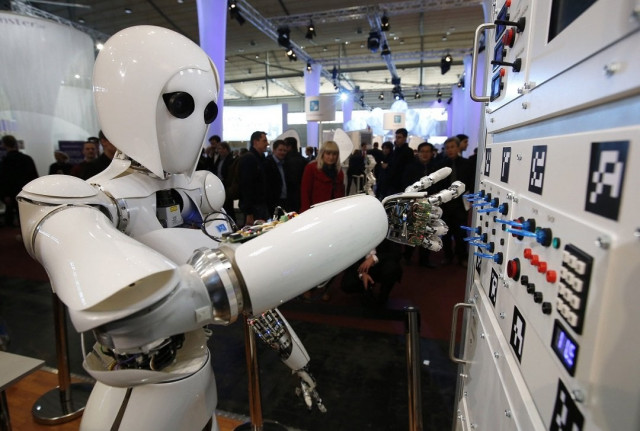Artificial intelligence’s role in future govts
Despite AI’s role in making governance smoother, humans will remain in control

PHOTO: REUTERS
For 30 years, that image – from the widely popular and iconic Terminator movie – has defined for much of the world what the future of artificial intelligence (AI) could look like: the rise of a sentient computer programme with a large robot army out to enslave the human race in a dystopian, post-apocalyptic world.
But there is a small band of believers who feel that the future of AI will look nothing like that.
Rather it will herald an era where the relationship between humans and machines will be symbiotic with the reins firmly in control of the former.
Experts, speakers and some entrepreneurs at the recently concluded seventh annual International Government Communication Forum (IGCF) in Sharjah talked about and showed what technologies such as AI and blockchain can do to help governments make their processes more efficient.
Inma Martinez, an AI scientist and pioneer, notes that governments, owing to the complex systems they run and the vast amounts of data that they are designed to generate, are the ideal candidates to apply AI.
“One of the nicest things about algorithm [run by AI] is that they show you realities what you with your brain could never envision but when you put it through a machine which is able to transect and analyse thousands of terabytes, a new reality emerges,” she said, adding that when this reality emerges through the semi-filtered lens of a computer, there is an opportunity to improve things.
“If you are to apply AI in the health care system, how can you make it easier to make appointments with doctors. When you run that data, for example, you may encounter that most people call on Mondays between 9am and 12pm and then nobody calls between 5pm and 6pm. So then you are like ‘let’s incentivize people to call in the afternoon, they will wait less on the phone and then everything will be smoother and easier’,” Martinez offered.
But does this mean that in the future, humans could delegate the task of governments to computers?
For 14-year-old Tanmay Bakhshi, the youngest person to ever secure an AI certification from Microsoft, that is unlikely to happen.
“A government’s job is simply too complex for an AI to take over entirely,” he said after delivering a keynote speech on AI at the conference.
His and Martinez’s reasoning: AI does not have the innate human ability for creativity.
“[AI does] not know how to generate random numbers in the first place. When a computer generates a random number it is a pseudo-random number - it just takes the current time and runs a mathematical operation on it and there we go, a random number,” he said.
This is where, Bakhshi believes, the AI loses out in a subject such as governance.
“Government work requires critical thinking, they require imagination,” the 14-year-old self-taught AI expert said.
So where can AI help governments?
Bakhshi believes that a majority of work fields will not be replaced completely by AI, but that machines will take over small individual components which will allow them to get things done in a much easier way.
“But it won’t take [over] entire governments as a whole,” Bakhshi opined.
Going forward, AI, Martinez hopes, will be alerting decision-makers about the problems arising, offer the data and point towards possible solutions.
Setting the groundwork
Notwithstanding what the future may bring, some people have already started working on integrating AI into government functions, taking data and analyzing them for identifying areas which can be optimized to make current functions smoother and more efficient.
Two startups came to the conference from different parts of the world: CityGrows from the United States and CitizenLab from Belgium.
Catherine Geanuracos, the chief executive officer (CDO) for CityGrows, outlined how they wanted to help governments be more efficient by automating or allowing AI to improve simple tasks which would then allow limited government resource to dedicate their time to more pressing tasks.
“A huge amount of government work and operations are still paper-based,” Geanuracos said, adding that her company offers workflow solution for governments to improve processes.
Curiously, Geanuracos targets governments directly as clients rather than create an ecosystem with the public who then push the government towards adopting these processes.
“This [system] is to the benefit of governments who want to optimize mundane tasks,” she said, adding that with the list of clients they have in the US and elsewhere, they were keen on a top-down approach to this.
CitizenLab CEO Wietse Van Ransbeeck, though, approaches AI and governments a little differently. His company helps governments build forums where people can post about the issues they are facing in their neighbourhoods.
An AI system on the backend then helps redirect those queries and complaints to the relevant officials and helps solve problems.
The two systems are somewhat similar to programmes and systems already being employed in the Punjab and Khyber-Pakhtunkhwa, but AI can offer each an opportunity to improve their systems.


















COMMENTS
Comments are moderated and generally will be posted if they are on-topic and not abusive.
For more information, please see our Comments FAQ